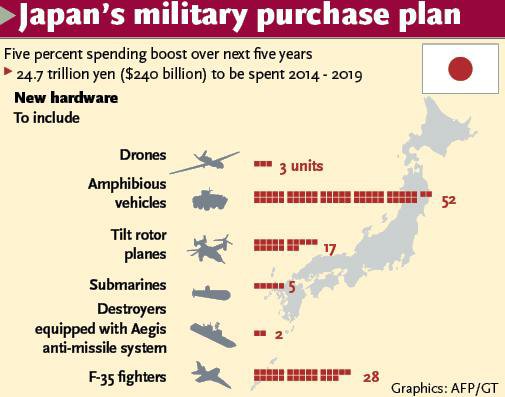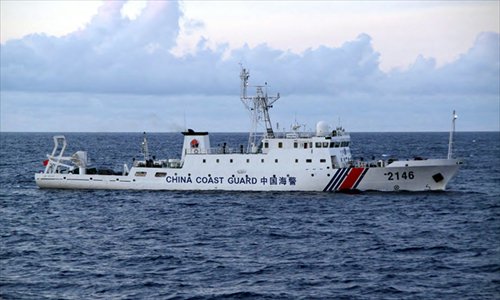Tokyo's defense plan targets China: experts


This handout picture taken and released by the Japan Coast Guard shows a China Coast Guard ship cruising near the Diaoyu Islands in the East China Sea on Thursday. Photo: AFP / Japan Coast Guard
The Japanese cabinet approved a defense policy package on Tuesday with a string of efforts to strengthen its military might, which experts say are targeted against China but fundamentally serve to facilitate Japan's revision of its pacifist constitution.
The package includes the defense program guidelines, a five-year defense buildup plan and the country's first national security strategy, which call for stronger air and maritime surveillance capabilities and improved ability to defend far-flung islands through such steps as setting up a marine unit, buying unarmed surveillance drones and putting a unit of E-2C early-warning aircraft on Okinawa island.
Soon after the documents were approved, China urged Japan to respect regional countries' "fair and reasonable" security concerns.
"Japan's policies in the military and security sphere are linked with its national development direction and will impact regional security," China's foreign ministry spokeswoman Hua Chunying told a regular press briefing on Tuesday.
Considering Japan's negative activities on historical issues, Asian countries, including China, and the international community have to be highly watchful and alert about Japan's actions, Hua said when asked to comment on the package.
The guidelines stated that Japan will strengthen surveillance over the Diaoyu Islands in the East China Sea, of which China and Japan are embroiled in a territorial dispute.
Japan will also introduce a "dynamic joint defense force" in a bid to boost the capabilities of its air, land and sea Self-Defense Forces (SDF).
Japanese Prime Minister Shinzo Abe said the shift would allow Japan's military to "make further contributions to the peace and stability of the international community."
In the defense buildup plan, the cabinet agreed to budget 24.7 trillion yen ($240 billion) over the coming five years for defense, in a strategic shift from its Cold War posture of defending against a Russian attack from the north toward a potential conflict with China to the west and south.
The spending sees an increase by 5 percent over the five years ending in March 2014, but the figure could be trimmed by up to 700 billion yen if the defense ministry can find savings and efficiencies.
Tokyo will also purchase stealth fighters, drones and submarines to upgrade its military hardware.
"While Japan used to make small moves of this kind, it's worth noting that the major changes in its military strategy this time explicitly target a rising China. Abe attempts to pool such massive resources [to enhance military power] to counter China," Wu Huaizhong, a deputy research fellow of the Institute of Japanese Studies at the Chinese Academy of Social Sciences (CASS), told the Global Times.
The document evidently shows that Japan's security policies are shifting from a self-defense type to an offense-orientated one, Wu added.
The national security strategy, enacted at the order of Abe, cites China's assertive activities in the East China Sea and the South China Sea as regional challenges, and warns that Beijing has been laying claims that are "incompatible with international law" and could lead to a confrontation, the Kyodo News reported.
Japan will continue to urge China to exercise restraint, and deal with the issue in a "calm and resolute manner" so as not to escalate tensions, the strategy states, according to Kyodo.
"Japan uses the threat from China's development as the excuse for strengthening military might so as to revise its pacifist constitution and become a 'normal country,'" Lü Yaodong, an expert on Japanese studies also with CASS, said.
The strategy also calls for Japan not only to upgrade its cooperation with the US but also to strengthen ties with South Korea, Australia, Southeast Asian countries and India.
It is stated in the strategy that Japan will seek more "proactive" security roles for the SDF abroad, and will set new guidelines on arms exports, signaling a major shift from the country's previous restrictive policy.
"While Japan stresses its alliance with the US, it also tries to beef up ties with other countries to reduce its dependence on the US," Lü said.
With fewer restrictions on arms exports, Japan can work with foreign defense enterprises to improve its own military strength through joint research and development, Lü noted on Tuesday.
Agencies contributed to this story